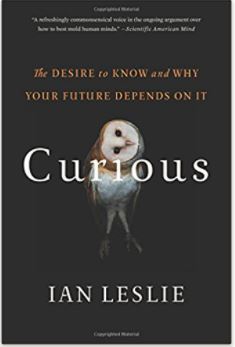I have been and remain a big believer in curiosity. A curious mind prepares us to be open to new ideas, assimilate and synthesize those ideas with our own thinking and operations, and lays the foundation for those serendipitous moments that unexpectedly reveal themselves.
So, it has been delightfully reaffirming to read Ian Leslie’s Curious: The Desire to Know and Why Your Future Depends on It. While I’m still a couple of chapters from completion, Leslie’s book is a fine read and a well-reasoned argument for making curiosity the key to unlocking our world of information abundance.

Ian Leslie’s book is not only a good read, it has a fantastic cover!
There is one section, however, that keeps playing over in my head: He argues that the (over-) abundance of information is making us less curious. Put another way, easy answers make us less curious, and less able to do the necessary sense-making.
[Curiosity] is also about discrimination; it involves choices about which knowledge we want to explore. The Web can give us answers before we’ve even had time to think about the question. It can also make it too easy for us to ignore our own ignorance.
Google… is more like a railway booking office – a place to visit when you know your destination. A truly curious person know that she doesn’t always know what she wants to know about… Google never says, “I don’t know.” (pp. 72-5)
The idea that it is all the easier for us to ignore our own ignorance given the ease of answers alarms me. I hadn’t really thought of it that way. But taken with what we already know about the dangers of confirmation bubbles, I now think that Leslie is quite right.
True intellectual curiosity may be harder than ever to maintain. As he suggests, curiosity is stoked by unanswered (perhaps even unanswerable) questions. It’s been my experience that it is the constant sense-making, PKM practices and networking with other curious, smart people that stokes my own curiosity.
The good news: These are learned behaviors! So, who is teaching them? I’ll follow up soon with some ideas about this means for workplace learning in a future post. This is still fresh in my mind’s gears, so I welcome your thoughts.

Leave a comment